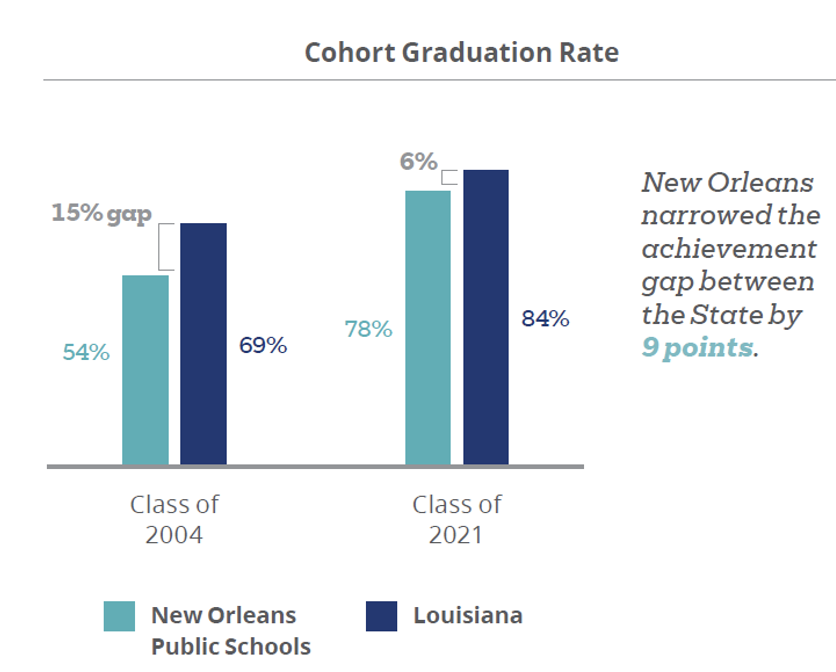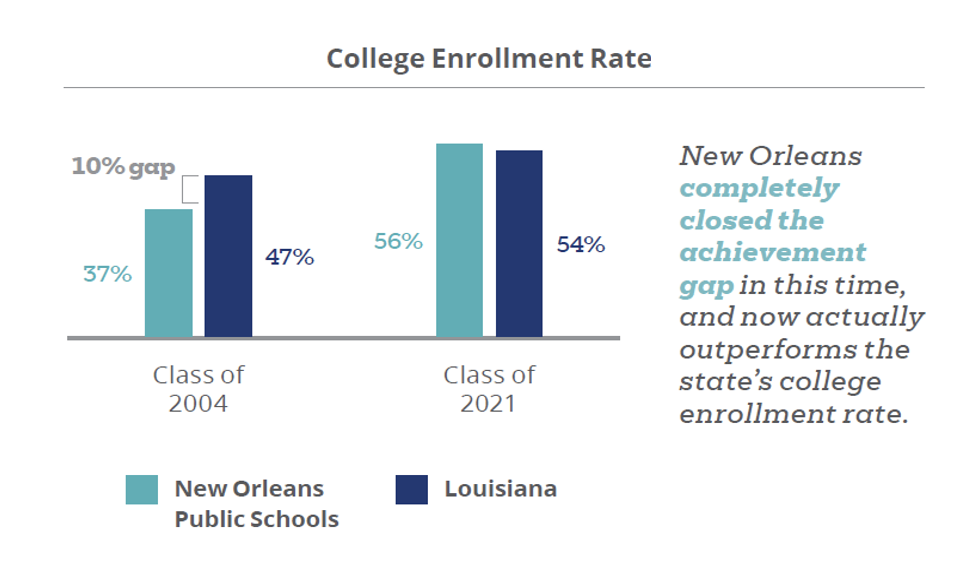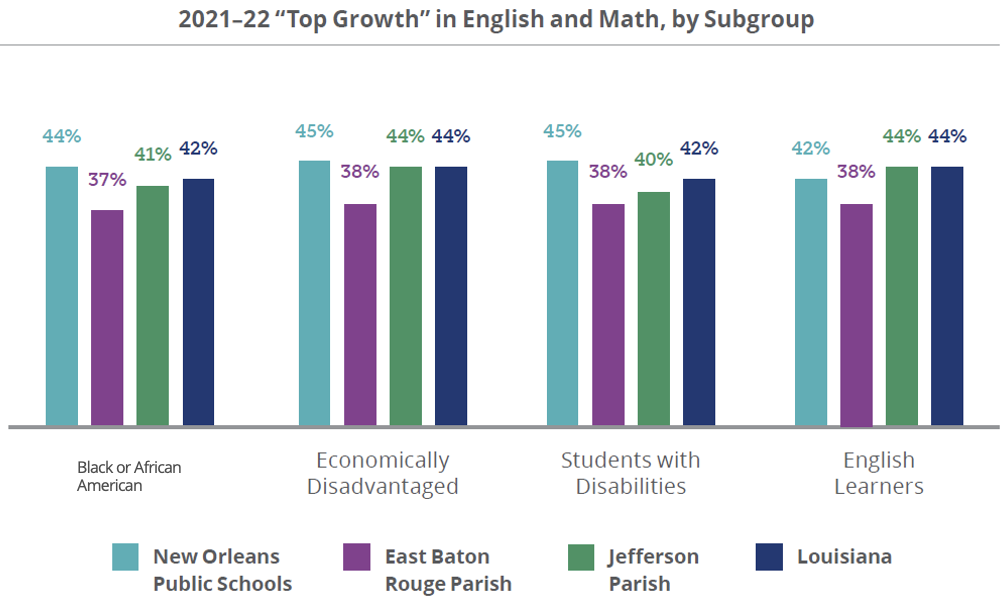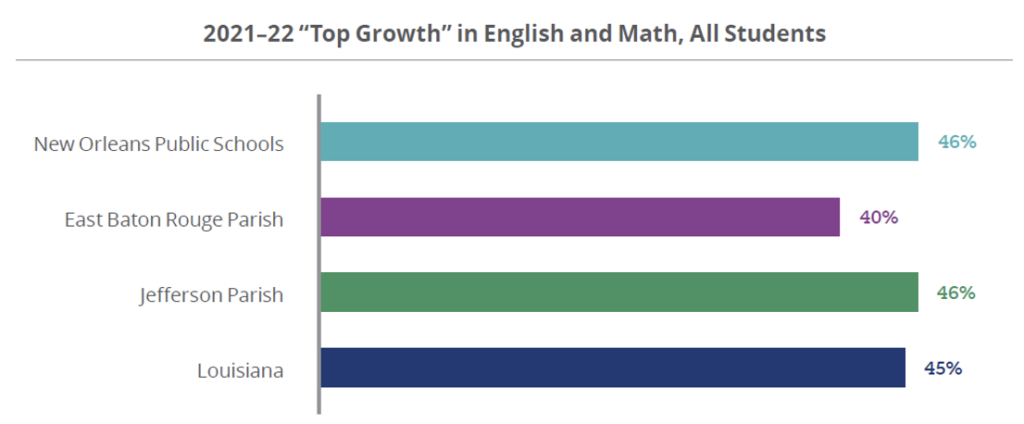Our mission at New Schools for New Orleans is to deliver on the promise of a great public school for every child in our city. Our children deserve schools in which they are fully welcomed and loved. They deserve healthy learning communities in which they feel a sense of belonging, and their teachers feel deeply supported. We are grateful that in New Orleans, our system of schools facilitates and invests in this. Instead of a single, central bureaucracy, our district is structured to give more decision-making power to schools, educators, and families–those closest to children. We prioritize choice and autonomy for families and educators while holding schools accountable for providing the education children deserve.
Our schools have made great, measurable progress over the past 15 years. We also know there is a lot of work ahead before every child has the education and opportunities they deserve. There is fair, important debate about what it will take to get there, but there’s no question that equity and access need to be at the center of any discussion. At NSNO, we believe our current system preserves that access and equity. We also believe in Act 91, which codifies those values in law. Recently, we’ve seen some challenges to those values, and suggestions that we cut away some essential elements of Act 91. At NSNO, we believe these critical elements of Act 91 should remain in place. We can–and must–evolve and improve.We can do so within the structures we already have in place, ones that have facilitated tremendous growth for children. We can build on nearly two decades of progress and collaborate to keep helping schools improve.
Progress over 15 years
Our improvement over the last 15 years has been impressive. In 2005, for instance, 61% of our schools were deemed “failing” or “academically unacceptable” by the state, a 48% percentage point gap with the state. Nearly half of our students weren’t graduating from high school. Today, 17% of our schools have a letter grade of “F,” compared to 10% statewide, just a 7% gap. This is particularly notable given that the criteria for an “A” have risen over time, and academic standards have grown more rigorous.
Post-secondary opportunities are expanding for our students. Between 2005 and 2021, the percentage of students graduating from high school leapt from 54% to 78%, and when it comes to college enrollment, we now surpass the state average, with 56% of our students enrolling.


Our students’ are improving academically, too, and moving forward after the setbacks caused by the COVID-19 pandemic and Hurricane Ida. New Orleans’ percentage of students earning “Top Growth,” which measures students’ year to year improvement on the state Louisiana Educational Assessment Program (LEAP) 2025 tests, surpasses the state average. (You can read more about academic progress in our district in our “NOLA By the Numbers” document, here.) Growth is a key factor when considering how a school performs; it measures exactly how well a school is educating the students that walk through its doors, no matter what level they started at

.

A system built around equity and access
This progress is the result of the hard work of students, educators, and families. It has been facilitated by the unique nature of our district, and its ongoing focus on the evolving needs of families and students. Schools have had the autonomy to develop the unique programs that meet their students’ needs, while school accountability has ensured that those programs deliver what families expect and deserve. Schools also worked collaboratively with each other, the Recovery School District, and NOLA-PS to create system-level structures that worked to advance equity and access.
In 2016, these rights and responsibilities were codified through an important piece of state legislation, Act 91, now codified in law as La. R.S. 17:10.7.1. Act 91 unified public schools in New Orleans under the authority of the Orleans Parish School Board (OPSB), which means that OPSB is now responsible for the oversight of all former Recovery School District charter schools. Act 91 solidified elements of family choice and access and gave schools autonomy to innovate while holding schools accountable for their academic performance, governance, and fiscal management.
Ultimately, Act 91 helps us continue to build a more equitable system of schools, and we must preserve it. This is key–we know that many of our students face profound barriers as a result of systemic racism and economic inequity. Our schools feel the impact of this, too. That’s why it’s crucial that we build a focus on equity into everything we do in education.
Equity in school funding
Act 91, for instance, sets out the use of a differentiated funding formula, which provides more funding for students whose education costs more to provide. In many districts across the nation, and for many years in New Orleans, funding for schools was not calibrated to students’ needs. A school in which 25% of students had disabilities, for instance, might need more resources, technologies, and staff to educate their students well–but they might get the same amount of funding as a school the same size in which just 5% of students had disabilities. Funding like this, where only the number of students is taken into account–not their varying needs– can leave schools without the resources they need to adequately support students with unique needs.
In 2007, the Recovery School District developed a way to address this: “differentiated” funding. All schools still receive “baseline” funding for each individual student, but the formula increases funding based on certain categories of students’ needs–such as students who are learning English or who have disabilities. In 2015-16, RSD and OPSB worked together with school leaders to develop an updated formula to apply to all RSD and OPSB schools beginning with the 2016-17 school year. When Act 91 was adopted, it codified the use of this type of funding formula–and with community input, they have continued to hone and adjust it.
“When I talk to my colleagues across the state and country, they are astonished by how equitable the funding formula is in New Orleans. We can focus on meeting the needs of our scholars,” says Jerel Bryant, CEO of Collegiate Academies. “Those resources have been critical to our network developing groundbreaking specialized programs like Opportunities Academy, our rigorous full-day program for young adults ages 18-21 with intellectual disabilities and autism. And when new needs emerge, like a significant increase in scholars who are new to the country and learning English, we work together as a system to recalibrate the funding to make sure all young people are getting the support they deserve.”
Prioritizing equity in expulsion policies and procedures
Our district has importantly moved away from the no-excuses discipline models that some schools utilized immediately after Hurricane Katrina. During this time, each school could set its own standard for expulsion, which often led to significant inequities.Our community, students, families, and educators spoke up. In 2012, the Recovery School District created a centralized Student Hearing Office and set of expulsion policies and practices, so that all students would be held to the same standards for this serious consequence. Their policy ensured that no school can independently remove a student, that students are expelled only for the most serious offenses, and that students who are expelled are placed in a new school environment that can meet their unique needs.
When Act 91 was passed, it preserved this centralized expulsion procedure. This is part of why, we believe, New Orleans’ schools rates of expulsion are significantly lower than the state average and lower than other similar districts. And today, we see many schools exploring restorative and holistic approaches to discipline, instead of traditional reactive, punitive measures.
“We take a restorative approach to discipline,” explains Stefin Pasternak, co-founder of Living School. “We’ve developed a robust spectrum of Restorative Practices that we use to try to avoid suspensions or expulsions as disciplinary threats. Instead, we work to build strong relationships with every student and their family to help us deeply understand the root causes behind behavior issues.
At Living School, we embrace healthy conflict as part of being in right relationship with our community and our Legends know that making mistakes is an important part of life–as is repairing any harm that we cause.
Preserving equity in access and enrollment
We are also proud of the ways in which our district has moved toward equity in access to schools themselves. In most districts, if the school that best meets a family’s needs is not in their neighborhood, their children are unable to attend it. A family might be drawn to a school with a unique program–like a garden class, language immersion, a great athletics department, or a STEM innovation lab–but if that school is across town, their child can’t go. In New Orleans, students can apply to and have the chance to enroll in schools across the city, no matter where they live. Act 91 preserves this access.
Each year, students fill out the New Orleans Common Application Process (NCAP). They list their top choices of schools, and then, a lottery determines their placement–not who they know, how much money their parents make, or where they live. Because families expressed that it was important to them, the lottery does more heavily “weigh” students being placed in the same school as their siblings and PK-8 students being placed in a school close to home if they so choose. In the 2022-23 school year, 90% of kindergarten and 9th grade students who applied to schools in the NCAP’s “main round” got a spot for that child in one of their top three schools.
“We’ve used our autonomy as a charter school to innovate and provide New Orleans families with more diverse school options,” says Melanie Askew, founder of Elan Academy. “Our school provides a unique classical curriculum that focuses on grammar, logic, and rhetoric and attracts families from all over the city. Our enrollment system allows those families who really want what Elan has to provide to enroll in our school–whether they live in our neighborhood or across the river.”
Driving continuous improvement
We are hopeful about these markers of progress. We trust the ways the district holds schools accountable for their progress, too. NOLA-PS closely monitors the academic success, fiscal management, and state of facilities in every school. They are empowered to help, support, and intervene as schools need. OPSB and NOLA-PS have the authority to make new policies and shifts that continue to help schools improve and structure our district to better serve children. Within the structure that Act 91 has set out, our district is able to change to meet our community’s evolving needs. It’s also held to structures and policies that ensure those changes don’t impinge on equity for students or accountability and autonomy for schools.
There are so many people in New Orleans who care deeply about our city’s children. We can, and must, harness this energy to work together. The structure of our district, as set by Act 91, does not prevent us from moving forward here. In fact, it provides the structure that encourages the innovation and progress needed to deliver on the promise of a great school for every child. When it comes to issues like expulsion, enrollment, and funding formulas, we’ve made real progress toward more equitable schools and Act 91 secures those advances. There’s still so far to go, and it’s within our reach. We can ensure that every child feels a sense of deep belonging and has the resources and support they need to thrive, in and out of school. We must ensure we have a great teacher in every classroom, and those teachers have what they need as well. We must prioritize the well-being of students and educators alike. At NSNO, we look forward to listening, learning, and working together with our community to build an even stronger, more equitable school system. The children of this city deserve it.
